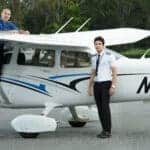What Is DGCA Exam Syllabus? The Ultimate 2025 Guide for Aspiring Pilots

What Is DGCA Exam Syllabus and Why It Matters?
If you’re planning to become a licensed pilot in India, one of the first questions you’ll need to answer is: what is DGCA exam syllabus? The Directorate General of Civil Aviation (DGCA) is the regulatory authority responsible for overseeing civil aviation standards in the country—including the exams required to obtain a Private Pilot License (PPL), Commercial Pilot License (CPL), and other ratings.
Each stage of pilot certification involves a rigorous examination process designed to assess your knowledge of aviation theory, air regulations, meteorology, and aircraft systems. Understanding the exact syllabus for these exams is critical to passing them on the first attempt—and staying on track in your training.
Whether you’re pursuing aviation as a career or a serious personal interest, this guide outlines the full DGCA exam syllabus, helping you navigate the subjects, exam formats, and preparation strategies required for success.
Overview of DGCA Exams for Pilot Licenses
To become a certified pilot in India, candidates must pass a series of theoretical examinations administered by the Directorate General of Civil Aviation (DGCA). These exams are a legal requirement for the issuance of various pilot licenses, including:
- Private Pilot License (PPL)
- Commercial Pilot License (CPL)
- Airline Transport Pilot License (ATPL)
Each license level has a different syllabus depth and number of subjects, but all exams are designed to ensure pilots have the theoretical knowledge to fly safely and legally within Indian and international airspace.
DGCA exams are typically taken after ground school training and before flight test and final licensing. They are delivered via Computer-Based Testing (CBT) at authorized centers across India. The exam pattern consists of multiple-choice questions (MCQs), and candidates must secure a minimum of 70% in each subject to pass (except for the RTR exam, which follows separate criteria).
Understanding what is DGCA exam syllabus is the foundation for structured preparation, helping students avoid delays and confidently progress toward their aviation goals.
What Is DGCA Exam Syllabus for PPL?
The Private Pilot License (PPL) is the entry-level license that allows individuals to fly non-commercial aircraft for personal or recreational purposes. To obtain a PPL, students must complete ground school and pass the DGCA-prescribed theoretical exams in the following subjects:
- Air Navigation – Basics of route planning, compass reading, and flight calculations
- Meteorology – Understanding weather conditions, wind patterns, and forecasts
- Air Regulation – DGCA rules, flight procedures, airspace structure
- Technical General – Basic aircraft systems, instruments, and aerodynamics
- Radio Telephony Restricted (Aeronautical) (RTR-A) – Required for ATC communication; conducted by the Wireless Planning & Coordination (WPC) wing, not DGCA
Exam Format:
- Mode: Online (CBT)
- Type: Multiple Choice Questions
- Language: English
- Passing Score: 70% in each subject (RTR has a different format and marking system)
Note: Candidates must have completed Class 10 and hold a valid DGCA Class 2 medical certificate to begin PPL training and appear for exams.
What Is DGCA Exam Syllabus for CPL?
The Commercial Pilot License (CPL) is a professional-level certification that allows pilots to operate aircraft for compensation. To qualify for a CPL, students must undergo rigorous ground and flight training, followed by a series of DGCA-conducted theory exams designed to test advanced aviation knowledge.
Here’s the full DGCA exam syllabus for CPL candidates:
Air Navigation – Includes the use of navigation instruments, flight planning, time-speed-distance calculations, and interpreting aeronautical charts.
Meteorology – Covers aviation-specific weather systems, METAR and TAF decoding, cloud classification, and hazards like wind shear and turbulence.
Air Regulation – Focuses on ICAO conventions, DGCA rules, AIP (Aeronautical Information Publication), NOTAMs, and standard air traffic procedures.
Technical General – Deals with aircraft engines, propulsion systems, flight instruments, hydraulic and electrical systems, and aircraft performance.
Technical Specific – Tailored to the actual aircraft type used in your training program. It includes performance limits, checklists, and emergency procedures.
Radio Telephony Restricted (Aeronautical) – Conducted by the WPC (Wireless Planning and Coordination Wing), this test assesses a pilot’s ability to communicate clearly and effectively with Air Traffic Control under real-time flying conditions.
Exam Requirements and Format:
- Pass Mark: Minimum 70% in all DGCA subjects
- RTR (A): Requires a minimum of 50% in both oral and written sections
- Flight Hours: CPL candidates must complete 200 hours of total flying, including specific hours in solo, cross-country, and instrument flying
These exams must be passed before applying for a CPL license. For most students, understanding what is DGCA exam syllabus early in their training helps structure preparation and reduce delays in certification.
What is DGCA Exam Syllabus Format & Evaluation Criteria
The DGCA exam structure follows a standardized digital format designed to evaluate a pilot’s theoretical knowledge across all critical areas of aviation. All exams, whether for PPL or CPL, are conducted through Computer-Based Testing (CBT) at DGCA-authorized examination centers located across India. This format ensures transparency, efficiency, and consistency for candidates nationwide.
Each subject in the syllabus is assessed through multiple-choice questions, with no subjective or descriptive components. This objective testing method allows for immediate processing and fair evaluation. The duration of each exam varies depending on the subject but typically falls between one to two hours. Students are advised to pace themselves carefully and familiarize themselves with the digital interface before exam day.
To successfully clear the DGCA exams, a minimum passing score of 70% is required in each subject. This standard applies uniformly across all theoretical components. An exception exists for the RTR (Radio Telephony Restricted – Aeronautical) exam, which is conducted separately by the Wireless Planning & Coordination (WPC) wing. In this case, candidates must score at least 50% in both the written and oral components to qualify.
Importantly, once passed, the results of these DGCA theory exams remain valid for five years. This provides aspiring pilots with a generous window to complete the required flight training and submit their application for license issuance without the need to retake the exams—provided all other criteria are met within this timeframe.
Understanding this format not only helps reduce anxiety but also allows students to structure their study schedules more effectively. Knowing how the exam is evaluated is just as important as knowing the syllabus itself—especially when working toward a high-stakes goal like a pilot license.
When and How to Apply for DGCA Exams?
Registering for DGCA exams is a structured process handled through the official Pariksha portal. This online platform is the centralized system for all pilot licensing exams in India, including PPL, CPL, and ATPL theory papers.
Applications can only be submitted during open exam windows, which are announced in advance by DGCA. Candidates must first create a profile on the portal, after which they can select their exam subjects, preferred testing center, and slot timing.
To complete the application successfully, students are required to upload several key documents:
- A valid DGCA medical certificate (Class 2 for PPL; Class 1 for CPL)
- A government-issued photo ID (such as Aadhar or passport)
- Proof of enrollment or course completion from a DGCA-approved flight school like the Florid Flyers Flight Academy India
- For CPL candidates, a flight training completion certificate or an endorsement from their school verifying 200 flight hours may be required at the time of license application
Each subject carries an exam fee, and the total amount depends on the number of papers selected. Candidates are advised to keep track of official notifications and updates on the Pariksha portal to avoid missing application deadlines or schedule changes.
Timely application and accurate documentation are crucial—without them, even well-prepared students may miss an exam cycle, causing unnecessary delays in training progression.
DGCA Exam Preparation Tips for Success
Success in DGCA exams depends as much on strategy and consistency as it does on academic understanding. While the syllabus is clearly defined, many students struggle due to poor planning or a lack of reliable study resources.
The first step toward effective preparation is to enroll in a DGCA-approved ground school that has a proven track record of successful student outcomes. These institutions typically provide structured classroom sessions, mock tests, and updated study materials that are aligned with the current syllabus and exam patterns.
In addition to classroom learning, it’s important to study from recognized aviation authors and publishers. Materials by Capt. Gopi Aviation Academy, Orbit Aviation, and other DGCA-specific guides are commonly used across the country. These resources often include simplified explanations and previous year’s question formats.
Mock exams are essential. Attempting past papers and online question banks can help students assess their readiness, identify weak areas, and improve time management. Students should also stay informed by checking DGCA notices and circulars, which may include minor updates or changes to the syllabus, particularly ahead of major exam sessions.
Finally, don’t underestimate the RTR (A) oral exam, especially for CPL candidates. Many students overlook this segment, yet it’s a key requirement for radio licensing and must be passed independently of the DGCA’s written exams.
Approaching exam preparation with discipline, verified study tools, and regular self-assessment greatly improves your chances of clearing all papers on the first attempt—keeping your pilot training on schedule and on budget.
Conclusion: Know the DGCA Syllabus Before You Train
Understanding what is DGCA exam syllabus is one of the most important steps for anyone preparing to become a pilot in India. Whether you’re aiming for a Private Pilot License (PPL) or a Commercial Pilot License (CPL), knowing the subjects, exam format, and passing requirements gives you a strategic advantage right from day one.
A clear grasp of the DGCA syllabus allows you to focus your efforts, manage your study time efficiently, and approach each subject with confidence. It also helps you avoid common pitfalls—like last-minute surprises, outdated study materials, or missing critical endorsements before applying.
Work with experienced instructors, study through recognized ground schools, and stay informed with DGCA updates. With the right preparation, passing these exams becomes a milestone—not a barrier—on your journey to becoming a certified pilot.
FAQs: What Is DGCA Exam Syllabus?
| Question | Answer |
|---|---|
| What is DGCA exam syllabus for PPL? | The syllabus includes Air Navigation, Meteorology, Air Regulation, Technical General, and RTR (A). |
| What is DGCA exam syllabus for CPL? | In addition to the PPL subjects, CPL includes Technical Specific and deeper knowledge in navigation, meteorology, and air law. |
| How do I pass DGCA exams on the first attempt? | Enroll in a quality ground school, study consistently, use mock tests, and review updated DGCA materials. |
| What is the minimum score to pass DGCA exams? | You need 70% in each DGCA subject. For RTR, a minimum of 50% is required in both oral and written parts. |
| Where can I register for DGCA exams? | Registration is done via the official DGCA Pariksha portal. |
Contact the Florida Flyers Flight Academy Team today at 91 (0) 1171 816622 to learn more about the Private Pilot Ground School Course.



Table of Contents






